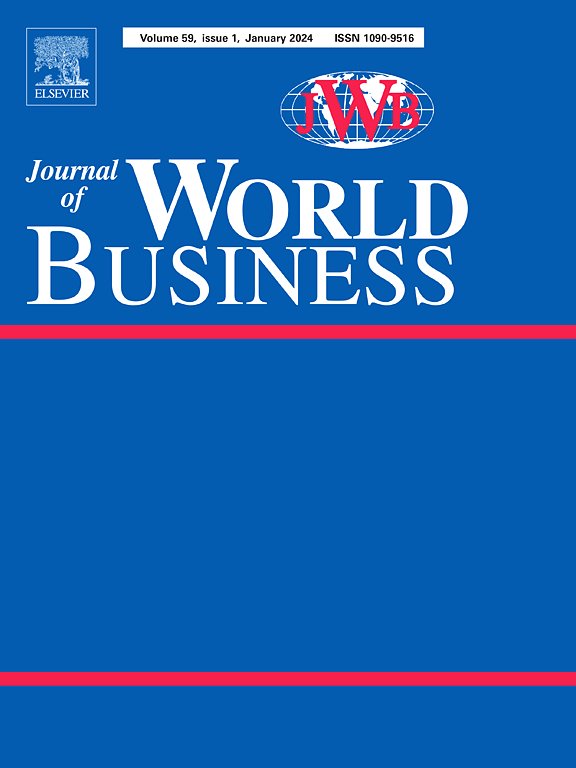US-China decoupling and the Chinese firms’ real option to defer overall but R&D investment
IF 8.8
1区 管理学
Q1 BUSINESS
引用次数: 0
Abstract
The evolving decoupling between the U.S. and China, and the resulting bifurcation of the global economy, represents one of the biggest external uncertainties in international business since the end of the Cold War. From a real options perspective, this study conducted a content analysis of the annual reports of Chinese publicly-listed firms (2016–2021) to capture how these firms perceived the uncertainty stemming from decoupling and adjusted their investment strategies accordingly. The data show that the perception of decoupling uncertainty, and associated concerns of the economic downturn and profitability, triggered Chinese firms to defer overall investments. The impact is limited to manufacturing industries where investment typically is more irreversible, and private firms’ investment decisions are more subjective to the uncertainty. Moreover, the impact differs across different types of investments: decoupling uncertainty affects capital expenditure but not R&D investment. Our study sheds light on the manifestations of decoupling in firm-level investment strategies. Furthermore, the study answers the call to incorporate subjective judgment of uncertainty in the real options theory by revealing the impact of perceived uncertainty on different types of firm investments.
中美脱钩与中国企业推迟整体研发投资的实际选择
中美之间不断演变的脱钩,以及由此导致的全球经济分化,是冷战结束以来国际商业中最大的外部不确定性之一。本研究从实物期权的角度,对2016-2021年中国上市公司年报进行了内容分析,以了解这些公司如何感知脱钩带来的不确定性,并相应地调整其投资策略。数据显示,对脱钩不确定性的认知,以及对经济下滑和盈利能力的相关担忧,促使中国企业推迟整体投资。这种影响仅限于制造业,因为制造业的投资通常更不可逆,私营企业的投资决策对不确定性更主观。此外,对不同类型投资的影响是不同的:脱钩不确定性影响资本支出,但不影响研发投资。我们的研究揭示了企业层面投资策略中的脱钩现象。此外,该研究通过揭示感知不确定性对不同类型企业投资的影响,回应了在实物期权理论中纳入不确定性主观判断的呼吁。
本文章由计算机程序翻译,如有差异,请以英文原文为准。
求助全文
约1分钟内获得全文
求助全文
来源期刊

Journal of World Business
BUSINESS-
CiteScore
16.50
自引率
11.20%
发文量
73
期刊介绍:
The Journal of World Business holds a distinguished position as a leading publication within the realm of International Business. Rooted in a legacy dating back to 1965, when it was established as the Columbia Journal of World Business, JWB is committed to disseminating cutting-edge research that reflects significant advancements in the field. The journal actively seeks submissions that propel new theoretical frameworks and innovative perspectives on International Business phenomena. Aligned with its domain statement, submissions are expected to possess a clear multinational, cross-border, or international comparative focus, while remaining pertinent to the study of management and organizations. JWB particularly encourages submissions that challenge established theories or assumptions, presenting pioneering or counterintuitive findings. With an inclusive approach, the journal welcomes contributions from diverse conceptual and theoretical traditions, encompassing allied social sciences and behavioral sciences. Submissions should either develop new theories or rigorously test existing ones, employing a variety of qualitative, quantitative, or other methodological approaches. While JWB primarily caters to scholars and researchers, it values contributions that explore implications for Multinational Enterprises and their management, as well as ramifications for public policy and the broader societal role of business.
 求助内容:
求助内容: 应助结果提醒方式:
应助结果提醒方式:


